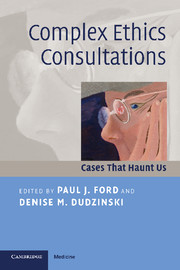Book contents
- Frontmatter
- Contents
- List of contributors
- Foreword
- Acknowledgments
- Introduction: Live and learn: courage, honesty, and vulnerability
- Part I Starting at the beginning: prenatal and neonatal issues
- Part II The most vulnerable of us: pediatrics
- Part III Diversity of desires and limits of liberty: psychiatric and psychological issues
- Part IV Withholding therapy with a twist
- 13 Listening to the husband
- 14 You're the ethicist; I'm just the surgeon
- 15 Haunted by a good outcome: the case of Sister Jane
- 16 Is a broken jaw a terminal condition?
- Part V The unspeakable/unassailable: religious and cultural beliefs
- Part VI Human guinea pigs and miracles: clinical innovations and unorthodox treatment
- Part VII The big picture: organizational issues
- Conclusions, educational activities, and references
- Index
13 - Listening to the husband
Published online by Cambridge University Press: 03 May 2010
- Frontmatter
- Contents
- List of contributors
- Foreword
- Acknowledgments
- Introduction: Live and learn: courage, honesty, and vulnerability
- Part I Starting at the beginning: prenatal and neonatal issues
- Part II The most vulnerable of us: pediatrics
- Part III Diversity of desires and limits of liberty: psychiatric and psychological issues
- Part IV Withholding therapy with a twist
- 13 Listening to the husband
- 14 You're the ethicist; I'm just the surgeon
- 15 Haunted by a good outcome: the case of Sister Jane
- 16 Is a broken jaw a terminal condition?
- Part V The unspeakable/unassailable: religious and cultural beliefs
- Part VI Human guinea pigs and miracles: clinical innovations and unorthodox treatment
- Part VII The big picture: organizational issues
- Conclusions, educational activities, and references
- Index
Summary
Case narrative
An ethics consultation request with haunting features occurred at a Catholic hospital where I was on staff. I had collaborated with the chair of the medical-moral committee (as it was known at the time) and the hospital attorney (to whom I reported) to write my job description. My responsibilities included teaching, policy development, and availability for ethics consultations “in a manner similar to other medical consultations.” Whether consultations would be carried out by an individual consultant, a small group, or the full ethics committee was to be decided. But before my arrival the small number of ethics consultations had been heard by the entire committee.
The first ethics consultation request came about two months after I was hired. Sr.Adrienne, director of pastoral care, related that aCatholic priest on staff was concerned about Ms. Barnes, a middle-aged woman with advanced chronic obstructive pulmonary disease (COPD) who was asking to be taken off ventilator support. The priest, Fr. Kelly, wanted to know: “How should we respond to requests to die in a Catholic hospital?” Sr. Adrienne was pleased to refer the question to me.
Several factors contributed to my discomfort with the ethics consult. I was new to the organization, and the position itself was new. Although I had years of teaching experience with healthcare professionals in a hospital setting, I had not been involved in ethics consultation itself. Given all this I felt a great sense of responsibility. I wanted to proceed cautiously and desired to attend to all details.
I recognized that ongoing contact with and guidance from the chair of the medical-moral committee and the hospital attorney were key.
- Type
- Chapter
- Information
- Complex Ethics ConsultationsCases that Haunt Us, pp. 105 - 111Publisher: Cambridge University PressPrint publication year: 2008



